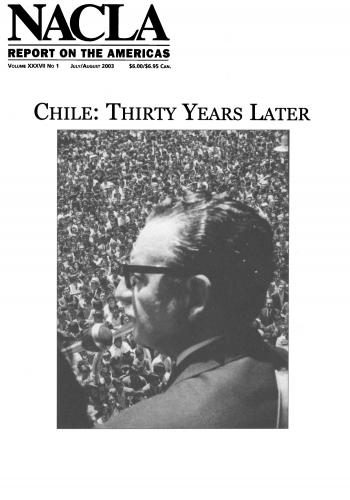Report
The past two decades have seen increasing conflict between Chile’s indigenous peoples—particularly the country’s largest indigenous group, the Mapuche—and a series of Chilean governments over questions of land rights and development.
Chile’s economy has been transformed over the three decades that have elapsed since the 1973 coup that imposed a bloody end to the country’s experiment in democratic socialism. Under the dictatorship of General Augusto Pinochet, the model of “import-substitution industrialization” that had characterized Chilean economic life for nearly half a century gave way to a radical experiment that would be emulated throughout the region during the 1990s and beyond.
As Chileans and progressives around the world mark the 30th anniversary of the violent military coup that overthrew Chile’s socialist president Salvador Allende, Latin America is arguably in the midst of a new resurgence of the left. After three failed presidential bids, Brazil’s first elected leftist president, Luís Inácio Lula da Silva, assumed office this year.
We can get a better sense of what the privatizing, austerity-driven Washington Consensus for the South is all about if we remember the market-based economic programs put in place in the North over two decades ago by Margaret Thatcher and Ronald Reagan.
“It is not a part of our country’s history that we are proud of.”
—Secretary of State Colin Powell, answering a question about the morality of U.S. policy toward the September 11, 1973 military coup in Chile and its relevance to the invasion of Iraq.
“This radio station will be silenced and my quiet voice will no longer reach you. But it does not matter; you will continue to hear it. I will always be with you, remembered as a man of dignity who was loyal to his nation.”
Salvador Allende, hardened by his long fight for the unity of the left, would probably feel deceived—but in no way surprised—if he saw today’s debilitating fragmentation of the people’s forces. Indeed, “the people” is not even used anymore, replaced by “the public,” “civil society” and other euphemisms that seek to dilute the potent political phrase and the very democratic system from which it is derived.
On the 30th anniversary of the military coup that toppled the Popular Unity (UP) government of Salvador Allende, we have both a political and a moral obligation to uncover the historical origin of the great political and ethical crisis that currently convulses our country.

